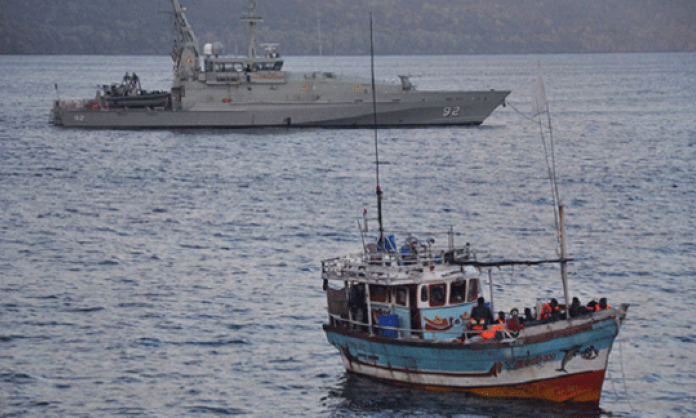It’s solidarity 101. An injury to one is an injury to all. Once human rights are trashed for some, the rights of the rest of us tend to follow. This isn’t just some feel good sentiment; it’s historical fact.
John Howard’s Liberal government set new lows in gutting refugees’ rights. People were locked up without charge or trial, for years at a time, while being subjected to torment and public vilification on a massive scale.
In late 2005, the Liberals’ racism against refugees morphed into a concerted, government-led, anti-Muslim political campaign, which culminated in the Cronulla riot. This happened in the very week that the government’s vicious anti-worker “WorkChoices” legislation was passed.
While the Liberals were assaulting the rights of every worker in the country, they and their shock jock allies were inciting riots against brown folk on Cronulla beach – a classic example of how the ruling class uses racism to divide and distract us. An injury to one, it turns out, really is an injury to all.
For this reason, as well as basic humanitarian sentiment, a series of unions have supported campaigns for refugee rights over the years. Just a couple of months ago, the ACTU congress unanimously adopted a decent motion about refugees. It supported on-shore processing and rejected boat turn-backs – the newest innovation of fortress Australia – pioneered by the current federal Liberal government.
But when the same issue came up at the Labor Party national conference, a bunch of the left unions that had waved this motion through ACTU congress – including the CFMEU and the MUA – voted the other way. Motions that will sit on the books are fine, it seems. An injury to one is an injury to all, we remind ourselves. Principles are great. Except when they aren’t politically convenient.
There are two main reasons advanced for this turnaround on refugee policy.
First, there is something called “real politics”. With a federal election looming, we’re told, disunity is death. Better to unite now behind Shorten and his turn-backs policy, clobber the Liberals, then deal with the shit within “our own” party.
In its own terms, this seems like compelling logic. The problem is, it can be used – in fact, it has been used – to justify caving in to pretty much anything. Uranium mining and the scrapping of land rights legislation in the 1980s, the wave of privatisations in the 1990s, Labor’s election-losing silence on human rights in the Tampa election of 2001.
As Louise O’Shea explains elsewhere in this edition of Red Flag, there is always some “compelling” reason to go along with the slide to the right in Labor politics. And that time when the left can push back the other way is always and forever deferred.
At its core, Labor’s basic problem is that it exists to govern something that by definition is not “our own”: a state that values borders over human life.
Second, there’s the argument that our own members are rednecks and racists. Of course, racism can have mass appeal; if it didn’t, the ruling class wouldn’t bother promoting it. But our obligation is to challenge, not cave into it. This is far from an impossible task.
At the height of the Liberal-induced anti-refugee hysteria of the early 2000s, I organised with the CFMEU for Abdul Baig – a human rights activist and refugee from Pakistan – to speak at our union’s monthly meeting of shop stewards.
Abdul had spent 20 years in the construction industry in Pakistan and the Middle East. He explained to us the history of US interference in Pakistan’s affairs; how he copped a bullet for running as an opposition candidate; how upon arriving in Australia to seek refuge he had been locked up, without charge or trial, for years.
The unionists listened in silence. One or two asked a question. Then one of the delegates started up: “I don’t care who you are, and I don’t care where you come from”.
“Uh oh”, I thought.
He continued: “I don’t care who you are, or where you come from. But locking up kids, for years on end, with no charge, is just wrong. And locking up women, and locking up men, for years on end, with no charge, with no trial, is just wrong. And we should know all about it! If you look at the papers and listen to the government, well we’re about as popular as refugees. So of course we have to support each other.”
The whole room burst into applause.
It won’t always be as easy as that: not all groups of workers have the same starting point as the militant construction workers in that room. But I often think of this small story as an illustration of the alternative to going along with the “real politics” of racism.
Sticking to a principled position, and finding a way to argue it, is the only basis on which we can challenge government-sponsored racism and human rights abuse. This is looking after all workers’ interests. Because an injury to one is an injury to all. It’s solidarity 101.











